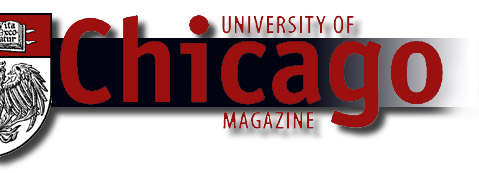 |
Religion
at Chicago is practiced in many ways, often by students who call
themselves more "spiritual" than "religious."
As my students and I clean up after the Thursday noon Eucharist
that has been a staple of the Episcopal campus ministry longer than
anyone can remember, we are careful—careful of the Salvadorian processional
cross our Catholic sisters and brothers use for their weekly mass;
careful of the hymnals used the day before in a weekly Divinity
School service; careful not to disturb the Muslim student who has
entered quietly, unrolled a prayer rug, and begun her midday devotion.
Passing Newberger Hillel Center on the way back to my office, the
aromas of its kosher lunch program scent the air. The signboards
of University Church and First Unitarian Church wear rainbow flag
decals signaling a welcome to lesbian, gay, and bisexual members
of the community. When campus ministers gather for their monthly
meeting, the circle includes as many women as men, more lay ministers
than ordained clergy, and representatives from a variety of practices,
including Asian American Students for Christ, Baha’i Students, U
of C Buddhist Association, and the independent evangelical Christian
congregation of University Community Church.
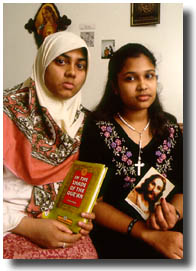 Catholics, Jews, Episcopalians, and the United Protestant Campus
Ministry maintain houses and full-time professional staffs offering
hospitality, worship, and programs. Lutherans, Baptists, and Unitarians
devote part-time clergy and lay leadership to campus ministry based
in local congregations. InterVarsity Christian Fellowship staff
coordinates student-led programs. This year’s religious preference
cards, optional forms returned by 25 percent of all registering
students, indicated that 29 percent identify themselves as Catholic;
Jews and “mainline” Protestants number 12 percent; Lutherans, Episcopalians,
Muslims, and Buddhists each represent 2.5–3 percent; and Hindus
have grown to nearly 4 percent.
Catholics, Jews, Episcopalians, and the United Protestant Campus
Ministry maintain houses and full-time professional staffs offering
hospitality, worship, and programs. Lutherans, Baptists, and Unitarians
devote part-time clergy and lay leadership to campus ministry based
in local congregations. InterVarsity Christian Fellowship staff
coordinates student-led programs. This year’s religious preference
cards, optional forms returned by 25 percent of all registering
students, indicated that 29 percent identify themselves as Catholic;
Jews and “mainline” Protestants number 12 percent; Lutherans, Episcopalians,
Muslims, and Buddhists each represent 2.5–3 percent; and Hindus
have grown to nearly 4 percent.
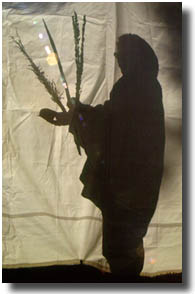
|
These are visible expressions of campus religious diversity. Less
visible are a significant number who identify themselves as more
“spiritual” than “religious.” The present student generation is
probably no more or less spiritual than its recent predecessors,
though increasingly these seekers come to the quest with no previous
religious heritage to shed, except those vestigial remnants of civil
religion that survive in the culture at large.
Young adulthood is the point of conscious embarkation upon the
journey of our lifetimes: making meaning out of our existence. Colleges
and universities are acutely engaged in this launching, equipping
us with the intellectual and critical tools to examine everything.
Still, the campus is pretty hard ground; seed may fall here, and
may even take root for a while, but only the strong survive. And
this is as it should be. Religion spawned the universities and each
shares a common goal—the pursuit of truth, the search for ultimate
meaning.
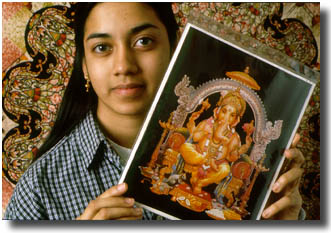 |
The search takes many directions. That largely invisible cohort
of spiritual-but-not-religious students pursues a path worn smooth,
though they may believe themselves the first to walk it. Occasionally
one will ask for an hour in my office; a friend has suggested I
might be helpful. The student arrives with a defensively apologetic
explanation for his or her religionless status; my response attempts
to preserve the delicate uniqueness of this vantage while simultaneously
assuring that I can live with it. My role, as Anglican pastor Kenneth
Leech named it, is that of “soul friend.” It’s more than just listening,
offering counsel—though it may include both. It’s being with another
as that person encounters any of the many questions, pitfalls, or
pains that come of such exploration.
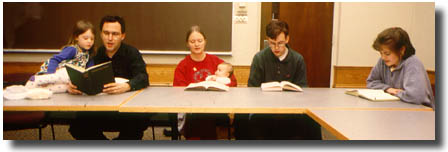 |
For others, this friendship is forged in long conversations over
beer at Jimmy’s or coffee in the Medici. Or in small groups who’ve
gathered to learn how to be women or men; lesbian or gay; African-,
Hispanic-, or Latino-American; or just how to be healthy, whole.
Whether students talk about their spirituality or not, it’s a significant
part of their lives. Introduced to ourselves as if for the first
time, we are often amazed, delighted, and frightened to discover
how complex we are. Set within so much diversity, we are challenged
to define ourselves. Given the variety we represent and the challenges
we present to one another, the true miracle is the high degree of
respect we experience here. With odd and statistically insignificant
exceptions, we are broadly tolerant, even appreciative of one another;
curiosity prevails over conversion.
Demographics on and off campus suggest that organized religious
life is changing drastically and traditional institutions stand
to be most radically affected. But the universal quest for meaning
is inherently spiritual. And if life at Chicago is indicative of
any broader trend, the future is rich with possibility. Those young
adults embarking on the search will likely find that, like learning
itself, this is a lifelong journey, and they’ll have lots of company
along the way, plenty of soul friends.
|

